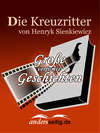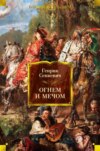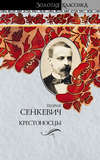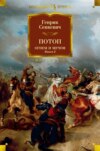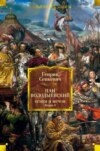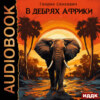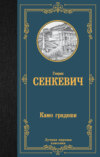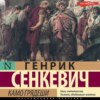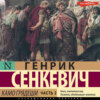Buch lesen: «The Deluge. Vol. 1»
TO HON. CHARLES A. DANA,
Editor of "The Sun,"
New York.
Sir, – I beg to dedicate to you this translation of a remarkable work, touching a period eventful in the history of the Poles, and the Slav race in general. You will appreciate the pictures of battle and trial contained in these volumes, for you know great events not from books merely but from personal contact. You receive pleasure from various literatures, and from considering those points of character by which nations and men are distinguished; hence, as I think, The Deluge will give you some mental enjoyment, and perhaps turn your attention to a new field of history.
JEREMIAH CURTIN.
Smithsonian Institution, Bureau of Ethnology,
November 25, 1891.
INTRODUCTION
The wars described in The Deluge are the most complicated and significant in the whole career of the Commonwealth, for the political motives which came into play during these wars had their origin in early and leading historical causes.
The policy of the Teutonic Knights gave the first of its final results in the war of 1655, between Sweden and Poland, since it made the elector independent in Prussia, where soon after, his son was crowned king. The war with Great Russia in 1654, though its formal cause came, partly at least, from the struggle of 1612, in which the Poles had endeavored to subjugate Moscow, was really roused by the conflict of Southern Russian with Poland to win religious and material equality.
The two fundamental events of Polish history are the settlement of the Teutonic Knights in Prussia, through the action of the Poles themselves; and the union of Poland with Lithuania and Russia by the marriage of Yadviga, the Polish princess, to Yagyello, Grand Prince of Lithuania.
Before touching on the Teutonic Knights, a few words may be given to the land where they began that career which cut off Poland from the sea, took from the Poles their political birthplace, and gave its name and territory to the chief kingdom of the new German Empire, the kingdom which is in fact the creator and head of that Empire.
Prussia in the thirteenth century extended from the Vistula eastward to the Niemen, and from the Baltic southward about as far as it does at present. In this territory lived the Prussians. East of the Niemen lived the Lithuanians, another division of the same stock of people. West of the Vistula lay Pomorye,1 now Pomerania, occupied at that time exclusively by Slavs under Polish dominion.
The Prussians, a people closely related to the Slavs, were still Pagans, as were also the Lithuanians; and having a more highly developed religion than either the pre-Christian Slavs or the Germans, their conversion was likely to be of a more difficult nature.
At the end of the tenth and in the beginning of the thirteenth centuries attempts were made to convert the Prussians; but the only result was the death of the missionaries, who seem to have been too greatly filled with zeal to praise their own faith and throw contempt on that of the people among whom they were really only guests and sojourners.
Finally, a man appeared more adroit and ambitious than others, – Christian, a monk of Olivka, near Dantzig. This monk, we are told, had a knowledge of the weak points of men, spoke Prussian as well as Polish, was not seeking the crown of martyrdom, and never made light of things held sacred by those to whom he was preaching. After a few years his success was such as to warrant a journey to Rome, where he explained to Innocent III. the results of his labor. The Pope encouraged the missionary, and in 1211 instructed the Archbishop of Gnezen to aid Christian with his co-workers and induce secular princes to help them.
Christian returned from Rome with renewed zeal; but instead of being helped he was hindered, for tribute and labor were imposed on his converts by the secular power. Since the new religion was coupled with servitude, the Prussians were roused greatly against it.
Christian strove to obtain relief for his converts, but in vain. Then, taking two native followers, he made a second journey to Rome, was created first Bishop of Prussia, and returned again to the field.
The great body of Prussians now considered all converts as traitors. The priests of the native religion roused the people, and attacked those persons as renegades who had deserted the ancient faith and were bringing slavery to the country. They went farther and fell upon Mazovia, whence the propaganda had issued. Konrad, unable to defend himself, bought them off with rich presents. The newly made converts were killed, captured, or driven to deep forests.
Christian turned to the Pope a third time, and implored him to direct against Prussia those Poles who were going to the Holy Land.
The Archbishop of Gnezen was instructed from Rome to make this change, and the Poles were summoned against Prussia for the following year. The crusade was preached also in Germany.
Warriors arrived from both countries in fairly large numbers, and during their presence ruined villages and churches were rebuilt in the district of Culm, where the conversions had taken place mainly. In a couple of seasons the majority of the warriors found their way home again. A second crusade was proclaimed, and men responded freely. All these forces were simply guarding the missionaries and the converts, – a position which could not endure.
Christian, seeing this, formed the plan of founding an order of armed monks in Poland like the Knights of the Sword in Livonia. Konrad gave his approval at once.
The Bishop of Modena, at that time papal legate in Poland, hastened the establishment of the order; for to him it seemed the best agent to bend the stiff necks of idolaters. Permission to found the order was obtained from the Pope, and a promise of means to maintain it from Konrad.
Christian, who had interested Rome and the West in his work, now gave great praise before the world to the Prince of Mazovia, who thereupon rewarded him with a gift of twelve castles and one hundred villages, reserving merely sovereign rights without income. This gift was confirmed to the Bishop of Prussia by Honorius III.
Christian labored so zealously that in 1225 he consecrated twenty-five superior knights in his new order, which received the same rules as the Livonian Knights of the Sword, – that is, the rules of the Templars.
The new knights were called Brothers of Dobjin, from the castle of Dobjin, which Konrad gave them as a residence, adding the district of Leslin near Inovratslav as a means of support.
As soon as the Brothers had settled in their castle, they attacked the Prussians, ruined villages, and brought in plunder. The enraged Prussians collected large forces, and attacked the land of Culm, with the intent to raze Dobjin. On hearing this, Konrad with his own troops and a general levy hastened to the relief of the order.
A bloody and stubborn battle of two days' duration was fought with great loss on both sides. Konrad, despairing of victory, left the field, thus causing the complete overthrow of the Poles. The surviving Brothers of Dobjin took refuge in the castle, which the Prussians were unable to capture. The order, shattered at its very inception, hoped for reinforcements from abroad; but the Pope at that juncture was sending a crusade to Palestine, and would not permit a division in the forces of the West. The Prussians, elated with victory, plundered at pleasure the lands bordering on their own.
In this disaster Christian conceived the idea of calling in the Teutonic Knights against Prussia. This idea, suicidal from a Polish point of view, was accepted by the Prince of Mazovia.
The Teutonic Order was founded in Palestine near the end of the twelfth century to succeed some German hospitallers who had resided in Jerusalem till the capture of the city by Saracens in 1187.
In a few years the new order became military, and under the patronage of Frederick, Duke of Suabia, afterward the Emperor Frederick II., acquired much wealth, with great imperial and papal favor. Under Herman Von Salza, who was grand master from 1210 to 1239, the future of the order was determined, its main scene of action transferred to the West, and that career begun which made the Teutonic Order the most remarkable of the weapon-bearing monks of Europe. Herman Von Salza-a keen, crafty man, of great political astuteness and ambition-had determined to win separate territory for the order, and the dignity of Prince of the Empire for the grand master.
Nothing therefore could be more timely for his plans than the invitation from the Prince of Mazovia, who in 1225 sent envoys to Herman; especially since the order had just been deprived in Transylvania of lands given to support it while warding off heathen Kumanians.
The envoys offered the Teutonic master Culm and some adjoining lands for the order, in return for curbing the Prussians. Herman resolved to accept, should the Emperor prove friendly to the offer. He hastened to Frederick at Rimini, explained the whole question, received a grant in which Konrad's endowment was confirmed; besides the order was given all the land it could conquer and make subject to the Emperor alone. The grand master's next care was to obtain papal approval.
Two envoys from Herman were sent to Poland, where they obtained, as the chronicles of the order relate, a written title to Culm and the neighboring land as well as to all Prussia which they could conquer. Near Torun (Thorn) a wooden fortress was built, called in German Fogelsang (Bird-song). This fortress was the first residence of the knights, who later on had so much power and such influence in the history of Poland.
Only two years later did Herman send his knights to Culm. One of the first acts was to purchase for various considerations, from the Bishop of Plotsk and from Christian, the Bishop of Prussia, their rights over the lands granted them in Culm. The labor of conversion began, and soon the grand master prevailed on the Pope to proclaim throughout Europe a crusade against Prussia.
From Poland alone came twenty thousand men, and many more from other parts of Europe. When the knights had made a firm beginning of work, their design of independence was revealed. They wished to be rid of even a show of submission to the Prince of Mazovia. They raised the question by trying to incorporate the remaining Brothers of Dobjin, and thus acquire the grant given them by Konrad. They had disputes also with Bishop Christian and the Bishop of Plotsk. In 1234 the Bishop of Modena was sent as papal legate to settle the disputes. The legate decided, to the satisfaction of the bishops, that of all lands won from the Pagans two thirds were to be retained by the knights and one third given to the bishops, the church administration being under the order in its own two thirds. For the Prince of Mazovia nothing was left, though he asserted sovereign rights in Culm and Prussia, and would not permit the order to acquire the grant given the Brothers of Dobjin by incorporating the remaining members of that body.
The Teutonic Order would not recognize the sovereignty of the Polish prince, and insisted on incorporating the Brothers of Dobjin. The order, knowing that Konrad would yield only under constraint, placed its possessions at the feet of the Pope, made them the property of the Holy See. This action found success; the Pope declared Culm and all the acquisitions of the order the property of Saint Peter, which the church for a yearly tax then gave in feudal tenure to the Teutonic Knights, who therefore could not recognize in those regions the sovereignty of any secular prince. In August, 1234, the Pope informed Konrad in a special bull of the position of the order, and enjoined on him to aid it with all means in his power. The Polish prince could do nothing; he could not even prevent the incorporation of the majority of the remaining Brothers of Dobjin, and of the lands and property given for their use he was able to save nothing but the castle of Dobjin.
Konrad now found himself in a very awkward position; he had introduced of his own will a foreign and hostile power which had all Western Europe and the Holy See to support it, which had unbounded means of discrediting the Poles and putting them in the wrong before the world; and these means the order never failed to use. In half a century after their coming the knights, by the aid of volunteers and contributions from all Europe, had converted Prussia, and considered Poland and the adjoining parts of Lithuania as sure conquests to be made at their own leisure and at the expense of all Western Christendom.
The first Polish territory acquired was Pomerania. The career of the knights was easy and successful till the union of Poland and Lithuania in 1386. In 1410, at the battle called by the names both of Grünwald and Tannenberg, the power of the order was broken. Some years later Pomerania was returned to Poland, and the order was allowed to remain in East Prussia in the position of a vassal to the Commonwealth. In this reduced state the knights lived for a time, tried to gain allies, but could not; the most they did-and that was the best for the German cause-was to induce Albert, a member of the Franconian branch of the Hohenzollerns, to become grand master. He began to reorganize the order, and tried to shake off allegiance to Poland; but finding no aid in the Empire or elsewhere, he acted on Luther's advice to introduce Protestantism and convert Prussia into a secular and hereditary duchy. This he did in 1525. Poland, with a simplicity quite equal to that of Konrad, who called in the order at first, permitted the change. The military monks married, and were converted into hereditary nobles. Albert became Duke of Prussia, and took the oath of allegiance to Poland. Later the Hohenzollerns of Brandenburg inherited the duchy, became feudatories of Poland as well as electors at home. This was the position during the war between Sweden and Poland described in THE DELUGE. Frederick William, known as the Great Elector, was ruling at that time in Brandenburg and Prussia. He acted with great adroitness and success; paying no attention to his oath as vassal, he took the part of one side, and then of the other when he saw fit. He fought on the Swedish side in the three days' battle around Warsaw in which Yan Kazimir was defeated. This service was to be rewarded by the independence of Prussia.
Hardly had the scale turned in favor of Poland when the Great Elector assisted Yan Kazimir against Sweden; and in the treaty of Wehlau (1657) Poland relinquished its rights over Prussia, which thus became sovereign and independent in Europe. This most important change was confirmed three years later at the peace of Oliva.
Frederick, son of the Great Elector, was crowned "King in Prussia" at Königsberg in 1701. The Elector of Brandenburg became king in that territory in which he had no suzerain.
At the first division of Poland, Royal Prussia of The Deluge, the territory lying between the Vistula and Brandenburg, went to the new kingdom; and Brandenburg, Pomerania, and Prussia became continuous territory.
The early success of the Teutonic Knights was so great that in the third half century of their rule on the Baltic their power overshadowed Poland, which was thus seriously threatened. Toward the end of the fourteenth century, however (1386), the Poles escaped imminent danger by their union with Lithuania and Russia. Through this most important connection they rose at once from a position of peril to one of safety and power.
This union, brought about through the marriage of the Polish princess Yadviga to Yagyello, Grand Prince of Lithuania, and by exceedingly adroit management on the part of the Polish nobles and clergy, opened to the Poles immense regions of country and the way to vast wealth. Before the union their whole land was composed of Great and Little Poland, with Mazovia (see map); after the union two thirds of the best lands of pre-Tartar Russia formed part of the Commonwealth.
Since Poland managed to place and maintain itself at the head of affairs, though this roused at all times opposition of varying violence in the other two parts of the Commonwealth, the social ideals and political structure of Poland prevailed in Lithuania and Russia, so far as the upper classes were concerned. In Lithuania, by the terms of the union, all were obliged to become Catholic; in different parts of Russia, which was Orthodox, the people were undisturbed in their religion at first; but after a time the majority of the nobles became Catholic in religion, and Poles in language, name, manners, and ideas. To these was added a large immigration of Polish nobles seeking advancement and wealth. All Russia found itself after a time under control of an upper class which was out of all sympathy with the great mass and majority of the people.
During the Yagyellon dynasty, which lasted from 1386 to 1572, the religious question was not so prominent for any save nobles; but ownership of their own land and their own labor was gradually slipping away from the people. During the reign of Sigismund III. (1587-1632), religion was pushed to the foreground, the United Church was brought into Russia; and land and religion, which raise the two greatest problems in a State, the material and the spiritual, were the main objects of thought throughout Russia.
Under Vladislav in 1648 the storm burst forth in Southern Russia. There was a popular uprising, the most wide-spread and stubborn in history, during which the Poles lost many battles and gained one great victory, that of Berestechko; the Southern Russians turned to the North, and selected the Tsar Alexai Mihailovich as sovereign.
Jan. 8, 1654, there was a great meeting in Pereyaslav,2 at which Bogdan Hmelnitski, hetman of the Zaporojian army and head of all Southern Russia, after he had consulted with the Cossacks, took his place in the centre of the circle, and in presence of the army, the people, and Buturlin, the envoy of Alexai Mihailovich, said: -
"Gentlemen, Colonels, Essauls, Commanders of hundreds, the whole Zaporojian army, and all Orthodox Christians, – You know how the Lord delivered us from the hands of our enemies who persecuted the Church of God and were envenomed against all Christians of our Eastern Orthodoxy. We have lived six years without a sovereign, in endless battles against our persecutors and enemies who desire to root out the church of God, so that the Russian name may not be heard in our land. This position has grown unendurable, and we cannot live longer without a sovereign. Therefore we have assembled a council before the whole people, so that you with us may choose from four sovereigns that one whom you wish. The first is the Sovereign of Turkey, who has invited us under his authority many times through his envoys; the second is the Khan of the Crimea; the third the King of Poland, who, if we wish, may receive us into former favor; the fourth is the Orthodox sovereign, the Tsar and Grand Prince Alexai Mihailovich, the sole ruler of all Russia, whom we have been imploring six years with unceasing petitions. Choose whom you like. The Sovereign of Turkey is a Mussulman; you all know how our brethren, the Greeks, Orthodox Christians, suffer, and what persecution they endure from godless men. A Mussulman also is the Khan of the Crimea, whom we took into friendship of necessity, by reason of the unendurable woes which we passed through. Of persecutions from Polish lords it is needless to speak; you know yourselves that they esteemed a Jew and a dog more than a Christian, our brother. But the great Orthodox sovereign of the East is of one faith with us, one confession of the Greek rite; we are one spiritual body with the Orthodoxy of Great Russia, having Jesus Christ for our head. This great sovereign, this Christian Tsar, taking pity on the suffering of our Orthodox church in Little Russia, giving ear to our six years' entreating, has inclined his heart to us graciously, and was pleased to send with his favor dignitaries from near his person. If we love him earnestly, we shall not find a better refuge than his lofty hand. If any man is not agreed with us, let him go whither he pleases; the road is free-"
Here the whole people shouted: "We choose to be under the Orthodox sovereign; better to die in our Orthodox faith than to go to a hater of Christ, to a Pagan!"
Then the Pereyaslav colonel, Teterya, passed around in the circle, and asked in every direction: "Are all thus agreed?"
"All with one spirit," was the answer.
The hetman now said: "May the Lord our God strengthen us under the strong hand of the Tsar."
The people shouted back in one voice: "God confirm us! God give us strength to be one for the ages!"
The hetman, the army, and the representatives of Southern Russia took the oath of allegiance to the Tsar. The result of this action was a war between the Commonwealth on one side, and Northern and Southern Russia on the other. The Commonwealth being thus occupied on the east, Sweden decided to attack on the west.
The war between Russia and the Commonwealth lasted thirteen years, and ended with a truce of thirteen years more, made at Andrusovo. By this agreement the city and province of Smolensk went to Russia, and all the left bank of the Dnieper, while Kieff was to be occupied by Poland after two years. This truce became a treaty during the reign of Sobyeski. Kieff remained with the Russians, and peace was unbroken till the second half of the following century, when all Russia west of the Dnieper was restored to the East in nearly the same limits which it had before the Tartar invasion; excepting the territory included in Galicia, and known as Red Russia.
Jeremiah Curtin.
Smithsonian Institution, Bureau of Ethnology,
November 25, 1891.












